Buying Property in Japan as a Foreigner
Your expert guide to buying property in Japan as a foreigner. Learn about the market, financing, legal steps, and how to build your professional team.
Posted by
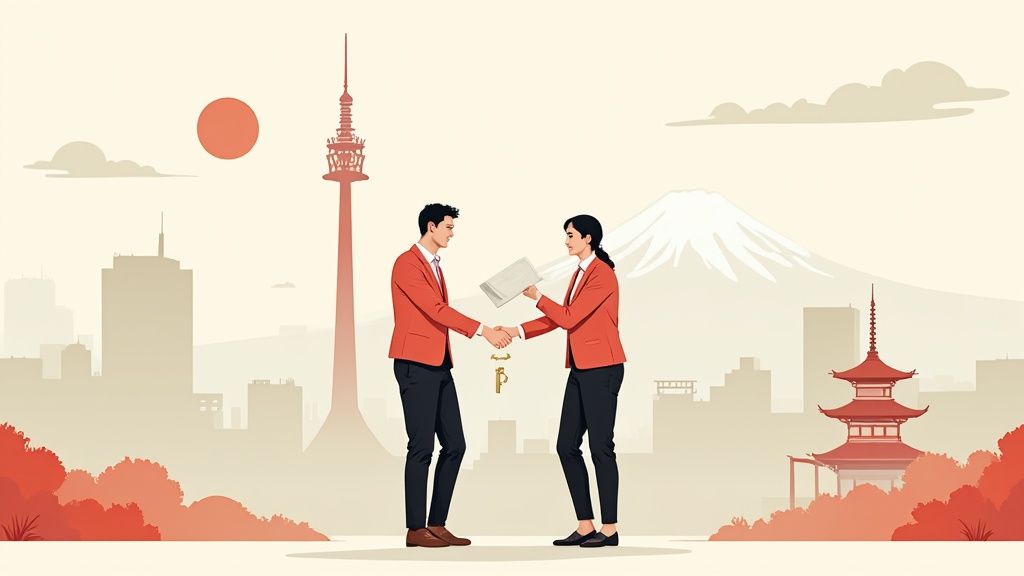
Let's get one thing straight right away: yes, you can absolutely buy property in Japan as a foreigner. In fact, Japan has remarkably few restrictions, making it a surprisingly accessible market if you know what you're doing.
This guide is designed to be your practical roadmap, cutting through the noise and confusion to give you a clear path forward.
Your Guide To Buying Japanese Real Estate
Forget the myths you might have heard. Japan’s unusually open policy for international investors creates opportunities that just don't exist in many other countries. We'll walk you through everything, from getting a feel for the market to handling the final paperwork, making the entire journey feel much less intimidating.
Unlike a lot of places, Japan imposes no legal restrictions on property ownership by foreigners. That means you have the full right to buy both land and buildings, whether you have a residency visa or not. This welcoming stance has brought a lot of international buyers into the market.
Of course, the returns depend on where and what you buy. A long-term rental in Tokyo might bring in an annual yield of around 3.5% to 4.5%. On the other hand, a short-term vacation rental in a tourist hotspot like Osaka could potentially hit 6% to 7%. The Japanese government is also making things easier by digitizing land registries, which helps simplify the administrative side of a purchase.
Understanding The Key Stages
The process can feel a bit overwhelming at first, but it breaks down into a few distinct phases. I've found that for most foreign buyers, the biggest hurdles are usually the language barrier and the difficulty of getting a loan without permanent residency.
This overview will give you a solid foundation. If you want to dive deeper into any of these topics, our comprehensive guide on how to buy property in Japan covers everything in much more detail.
To give you a clearer picture of the journey ahead, here’s a quick look at the main stages involved.
| Key Stages of Buying Property in Japan | | :--- | :--- | :--- | | Stage | Key Objective | Main Challenge for Foreigners | | Research & Planning | Define budget, select a region, and choose a property type (new, used, or akiya). | Overcoming the language barrier to access reliable market information. | | Assembling Your Team | Find a bilingual real estate agent and a judicial scrivener (shihoshoshi). | Finding experienced professionals who are used to working with international clients. | | Financing the Purchase | Secure funding for the property, either through cash or a loan. | Securing a mortgage is very difficult for non-residents. | | Legal & Closing | Sign agreements, pay taxes, and officially register the property title. | Navigating complex legal documents that are typically only in Japanese. |
Think of this table as your high-level checklist. Each stage has its own unique considerations, but knowing what's coming is half the battle.
Here’s a slightly more detailed breakdown of what to expect:
-
Research and Planning: This is where you nail down the fundamentals. What’s your budget? Which city or prefecture are you targeting? And are you looking for a new build, a used home, or maybe a vacant akiya (abandoned house) to renovate?
-
Assembling Your Team: You can't do this alone. At a minimum, you'll need a reliable, bilingual real estate agent and a judicial scrivener, known as a shihoshoshi, who is legally required to handle the title transfer.
-
Financing the Purchase: While buying is legally simple, financing is not. Getting a mortgage as a non-resident is notoriously difficult. Because of this, many foreign buyers end up purchasing with cash.
-
Legal and Closing Process: This is the final stretch. It involves signing the official purchase agreement, paying the necessary taxes and fees, and completing the property registration to make it officially yours.
Navigating this journey successfully is all about preparation. From the first spark of an idea to the moment you get the keys, having a clear understanding of each step is your greatest asset. It's less about overcoming impossible hurdles and more about methodical planning.
Navigating the Japanese Real-World Estate Market
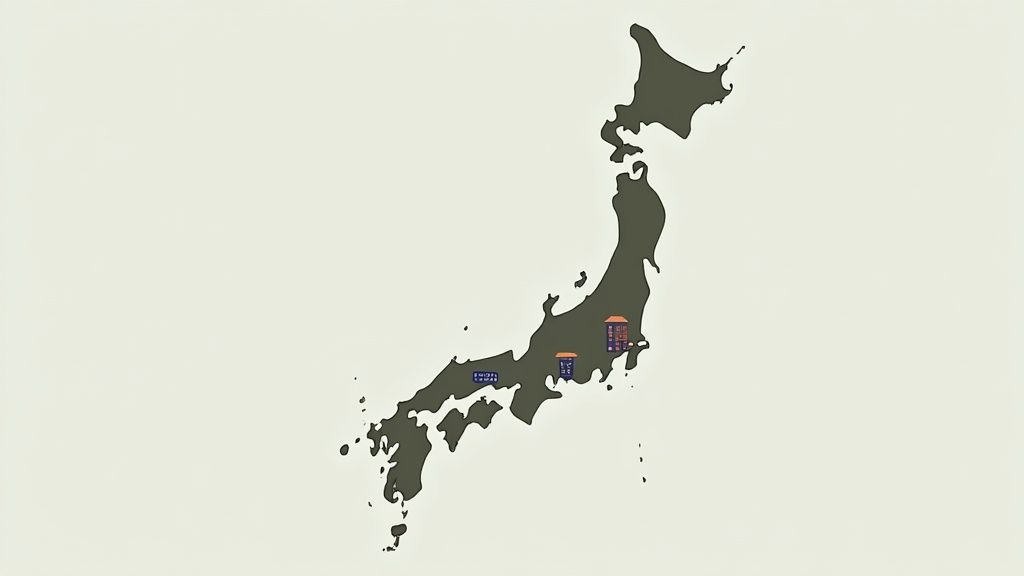
If you're coming from a Western real estate mindset, the first thing you need to understand about the Japanese property market is this: it's all about the land, not the house on top of it. This single concept dictates almost everything, from how properties are priced to what makes a good long-term investment when you're buying property in Japan as a foreigner.
One of the first forks in the road you'll encounter is the choice between a brand-new build, called shinchiku (新築), and a pre-owned home, or chuko (中古). The allure of a sparkling new shinchiku home is strong, but it comes with a financial reality that often blindsides foreign buyers.
In Japan, buildings depreciate at an astonishing rate. A standard wooden house, for example, is often considered to have almost no value after 20-25 years, no matter how well-maintained it is. When you buy new, you’re paying a huge premium for the construction itself—a cost that evaporates over time. The only thing that truly holds its value is the land.
The Shinchiku vs. Chuko Dilemma
This rapid depreciation is precisely why experienced investors and local Japanese buyers often lean heavily into the chuko market. A 15-year-old home might be in fantastic condition, but its price tag has already shed a decade and a half of depreciation. This means you're paying a price that's much closer to the actual land value, which is the part of your investment that will hold steady or, ideally, appreciate.
Let’s put it in numbers. Imagine a ¥50 million shinchiku house. That price might be a combination of ¥30 million for the land and ¥20 million for the building. In just a few years, that ¥20 million building value could be slashed in half, leaving you with an asset worth closer to the land value.
Now, consider a ¥35 million chuko home in the same neighborhood. You're almost certainly paying mostly for the land, making it a far more stable place to put your money.
Why Land Value is King
This laser focus on land value completely changes how you should look at a property. Don't just ask, "How old is the house?" Instead, the real question is, "What is this specific piece of land actually worth?" This is why the old adage "location, location, location" is on steroids in Japan.
Several key factors drive land value:
- Proximity to a train station: Being within a 10-minute walk of a station is a massive value-add in a country that runs on public transport.
- Neighborhood prestige: Is it a desirable area? Access to good schools, parks, shops, and restaurants all play a huge role.
- Zoning regulations: Local rules can dictate what you can (or can't) build, which directly impacts the land's future potential.
It's a fundamental shift in thinking. You're not just buying a home. You're buying a piece of land that happens to have a depreciating structure on it. The building is temporary; the land is the permanent asset.
This is especially true in Tokyo's central wards. While the prices for new condos can jump around, the used apartment market often shows steadier growth because the prices are so closely tied to the prime location itself. Recent market data tells this story perfectly. While new condo prices in the greater Tokyo area dropped 7% in April after a recent peak, the used apartment market in Tokyo’s 23 wards has seen nine straight months of growth, jumping by an incredible 28.3% year-on-year. For foreign buyers, this signals that the resale market can be a much more reliable path to appreciation. You can explore more about these market fluctuations to get a feel for the trends.
Making Smart Location Choices
This land-first approach also explains why different strategies work in different regions. In central Tokyo, where land is incredibly scarce, small chuko apartments in great locations are gold. Buyers know the building's value is almost an afterthought compared to owning a piece of one of the world's most important cities.
Head to a city like Kyoto, however, and the strategy might change. An investor might buy an old traditional house (kominka) and renovate it for the booming short-term rental market. In that case, the building itself has cultural and commercial value, but the investment is still underpinned by the immense value of the land in a top-tier tourist destination. The key to successfully buying property in Japan as a foreigner is to understand these realities and align your goals accordingly.
Assembling Your Professional Team in Japan
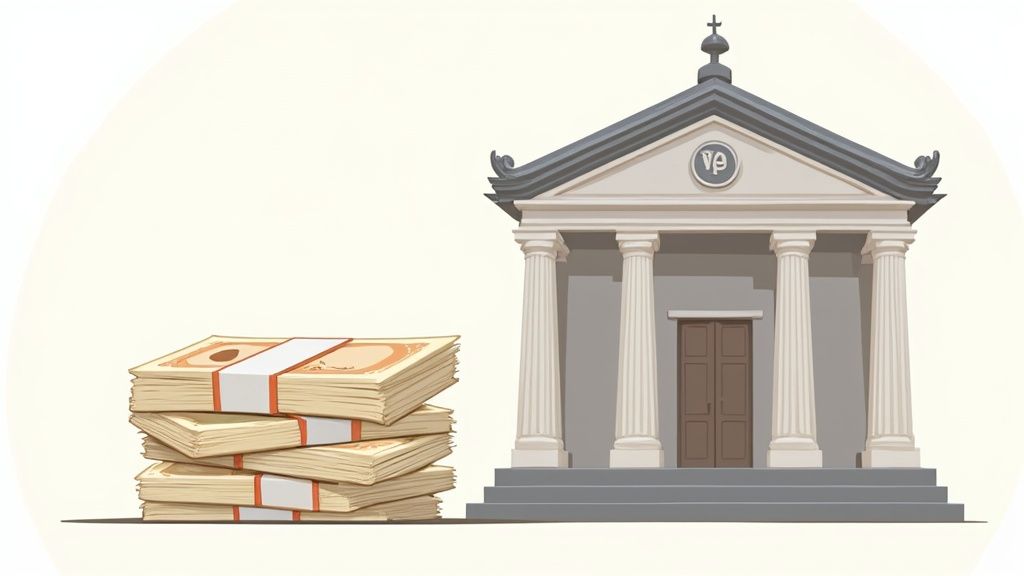 Trying to go it alone in Japan’s property market isn't just tough—it’s a recipe for disaster. The entire system is built around a network of licensed professionals, and each one plays a specific, legally-required role. For any foreign buyer, finding the right people isn't just a good idea; it's the most critical part of the entire process.
Trying to go it alone in Japan’s property market isn't just tough—it’s a recipe for disaster. The entire system is built around a network of licensed professionals, and each one plays a specific, legally-required role. For any foreign buyer, finding the right people isn't just a good idea; it's the most critical part of the entire process.
Your team will be made up of a few key players who will see you through from the first viewing to the day you get the keys. These aren't just advisors you can choose to hire; they are essential to making the deal happen. Let's break down who they are and what they do.
Your Indispensable Real Estate Agent
First up is your real estate agent, or fudousan-ya (不動産屋). This person is far more than just someone who shows you properties. They are your chief negotiator, your cultural interpreter, and your guide through a market that has its own unique rules. If you're buying property in Japan as a foreigner, a bilingual agent with a solid history of helping international clients is absolutely non-negotiable.
A great agent brings a lot more to the table than just translation. They can:
- Unlock Off-Market Properties: Some of the best deals, especially in hot markets like Tokyo or Kyoto, are never listed publicly. Agents have access to these.
- Explain the "Why": They can tell you why a property is priced a certain way or why a seller has a peculiar request—insights you'd never get on your own.
- Go to Bat for You: They handle the delicate dance of making an offer and all communication with the seller's side, making sure your interests are always front and center.
For their work, the agent’s commission, known as chukai tesuryo (仲介手数料), is set by law. The standard formula is 3% of the property price + ¥60,000, plus consumption tax. You'll typically pay this in two parts: half when you sign the purchase contract and the final half at closing.
The Crucial Judicial Scrivener
Once you’ve found "the one" and your offer has been accepted, the most important legal expert steps in: the judicial scrivener, or shihoshoshi (司法書士). You cannot legally buy property in Japan without one. Period. Their job is to manage all the complex legal paperwork and officially register you as the new owner at the Legal Affairs Bureau.
Think of the shihoshoshi as the gatekeeper of the transaction. They painstakingly verify everyone’s identity, confirm the property's legal standing, and ensure the title is clean. This is what protects you from any messy ownership claims down the road.
The judicial scrivener's work is the final, legally binding step that makes the property officially yours. Their fee, which typically ranges from ¥50,000 to ¥100,000, is a small price to pay for the legal certainty they provide.
This fee covers preparing all the registration documents and executing the title transfer. This is not an area to look for a discount; their involvement is mandatory and absolutely vital.
The Optional but Wise Tax Accountant
While you aren't legally required to hire one for every purchase, bringing a tax accountant, or zeirishi (税理士), onto your team can be a very smart move. This is especially true if you’re a non-resident or are buying property as an investment.
For instance, if you don't live in Japan, you have to appoint a local tax representative to handle your annual property tax payments. A zeirishi can fill this role perfectly, ensuring you stay on the right side of the law without any stress, even from thousands of miles away.
They can also give you strategic advice on how to minimize your tax obligations, from navigating the one-time property acquisition tax to planning for capital gains if you ever decide to sell. A few hours of their time can save you a significant amount of money and headaches later on, making their fee a sound investment.
The Purchase Process from Offer to Keys
So, you’ve found a property that feels right and you’ve assembled your team. Now it’s time to shift gears from just looking to actually buying. This is where things get official and the paperwork trail really begins. It might seem daunting, but the transaction process in Japan is incredibly structured, which is great because it protects both you and the seller every step of the way.
This chart gives you a bird's-eye view of what leads up to making a formal offer.
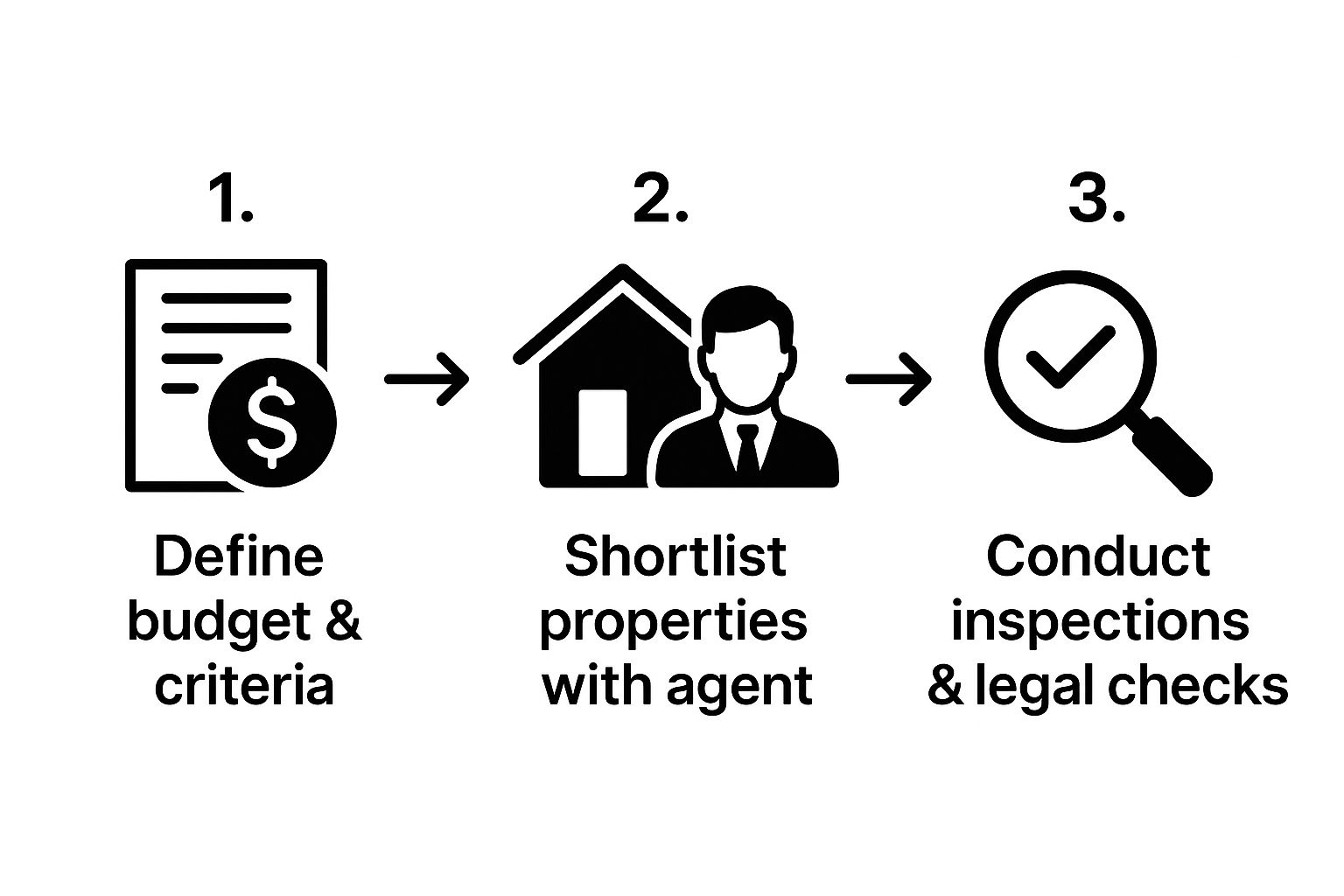
As you can see, all the foundational work—sorting out your budget, picking the right place, and doing your homework—happens before you sign anything. Getting this right makes the rest of the process much smoother.
Making Your Initial Offer
The first real move is to submit a Letter of Intent (LOI), known in Japanese as a kouyuu moushikomisho (買付証明書). Your agent will prepare this for you. Think of it as your official way of saying, "I'm serious about buying this property." It's not a legally binding contract, but it lays out your proposed price, your ideal closing date, and any other conditions you might have.
A well-crafted LOI signals to the seller that you're a committed buyer and gets the ball rolling on serious negotiations. Don't be surprised if there's a bit of back-and-forth here; that's completely normal. Your agent is your champion during this phase, handling all the communication to hash out a price and terms that work for everyone.
The Explanation of Important Matters
Once you and the seller have a handshake agreement on the main terms, the process moves into a crucial legal phase: the Explanation of Important Matters, or juuyou jikou setsumeisho (重要事項説明書). This is an exhaustive disclosure document that details absolutely everything you need to know about the property.
A licensed agent, usually from the seller's side, is legally required to sit down with you and walk through this document, page by page. It’s a long, detailed meeting for a reason—it’s all about protecting you, the buyer.
The document will cover things like:
- Property Title Information: Who the registered owner is and, critically, if there are any outstanding mortgages or liens.
- Legal Restrictions: This includes zoning laws, building regulations, and any specific neighborhood rules that might affect how you can use the property.
- Property Condition: Details on the building's structure, shared utilities, and any known defects or issues.
- Contract Terms: Outlines the deposit, what happens if someone cancels, and other key contractual obligations.
This meeting is your last chance to walk away from the deal without any financial penalty if you uncover something that gives you pause. Listen carefully, and don't hesitate to ask your agent to clarify anything that sounds even remotely confusing.
Signing the Purchase Agreement
If you're happy with everything in the Explanation of Important Matters, you'll move directly to signing the final Purchase and Sale Agreement, or baibai keiyakusho (売買契約書). This is it—the legally binding contract that officially seals the deal.
Right when you sign, you’ll also pay the earnest money deposit, called tetsukekin (手付金). This is typically 5% to 10% of the purchase price and serves as a firm commitment. If you decide to back out after this point for a reason not covered in the contract, you will lose this deposit.
On the flip side, this protects you, too. If the seller gets cold feet and pulls out, they generally have to refund your deposit and pay you a penalty of the same amount. It’s a system designed to ensure both parties are fully committed to closing.
The Final Settlement and Handover
The finish line is the settlement meeting, or kessai (決済). This usually happens about a month after you've signed the purchase agreement and brings all the key players into one room: you, the seller, both real estate agents, and the judicial scrivener who handles the legal paperwork.
Here’s a quick rundown of what goes down at the settlement:
- Final Payment: You’ll transfer the remaining balance of the purchase price into the seller's bank account.
- Fee Payments: Now’s the time to pay any outstanding costs, like your agent's commission and the judicial scrivener's fee.
- Title Registration: The judicial scrivener will immediately take all the signed documents to the Legal Affairs Bureau to officially register the property in your name.
- Key Handover: Once the funds are confirmed and the paperwork is filed, the seller hands over the keys.
And just like that, the property is yours. You’re officially a property owner in Japan! The whole process is methodical and transparent, built on a foundation of trust and legal clarity.
How to Finance Your Japanese Property
Alright, let's talk about the money. Securing the funds for your purchase is often the biggest hurdle you'll face as a foreigner buying in Japan. While the country's laws are surprisingly open to foreign ownership, its banking system can be a different story entirely.
To put it bluntly, getting a mortgage from a traditional Japanese bank without permanent residency is next to impossible. It's not personal; it's just how their risk models work. Most major banks see lending to non-residents as a high-risk game, and their approval process is built for locals.
The Japanese Mortgage Hurdle
If you don't hold permanent residency (PR), you’ll quickly discover that Japanese banks have a strict checklist that’s incredibly tough to meet. Even if you have a long-term work visa and a great job, many lenders will still turn you away.
Here’s what they are almost always looking for:
- Permanent Residency (PR): This is the magic key. Without it, your options all but vanish.
- A Japanese Spouse: Having a Japanese spouse who can co-sign or act as a guarantor can certainly help, but it’s not a guaranteed workaround.
- Language Fluency: All the paperwork—and there’s a lot of it—is in Japanese. You'll need to prove you can understand every detail of the complex contracts you’re signing.
- Long-Term Employment in Japan: Lenders want to see a stable, long-term work history with a Japanese company.
The hard truth is that for most non-resident buyers, a conventional Japanese mortgage just isn't a realistic option. Accepting this early in your journey will save you a ton of time and frustration, letting you focus on financing strategies that actually work.
The Power of a Cash Purchase
Given these roadblocks, the most common and straightforward path for foreigners is a cash purchase. It requires a lot of capital upfront, of course, but buying with cash sidesteps all the headaches of dealing with Japanese banks.
More importantly, it makes you a very attractive buyer. In a market where sellers value certainty and speed, a cash offer is a powerful tool. It removes any risk of the deal collapsing because of financing problems, giving you some real leverage when you negotiate. You can often close faster and sometimes even snag a better price.
For a complete overview of the entire process, be sure to read our detailed guide on how to buy property in Japan for more context.
We're seeing this play out in real-time in popular tourist spots. In 2025, foreign investment pushed property prices on Kaminarimon Street in Asakusa up by a massive 29%. A huge chunk of that came from cash-rich foreign buyers scooping up entire buildings for short-term rentals. One investor reportedly paid around 500 million yen (about $3.4 million USD) in cash for a 40-year-old building. This is a perfect example of how cash allows foreign buyers to move quickly and decisively, and you can learn more about this foreign investment trend.
Exploring Other Avenues
If a full cash purchase isn't on the table, a few other possibilities exist, though they come with their own set of challenges.
Some international banks with branches in Japan, like HSBC or Citibank, might be open to a conversation. However, they typically focus on high-net-worth clients and will likely require you to have a substantial, long-standing relationship with them already.
Another route is to secure a loan from a bank in your home country, using your assets there as collateral. This can get complicated with currency exchange risks and international legal hoops, but it's definitely an option worth discussing with your personal banker back home.
Getting to Grips with Taxes and Ongoing Costs
When you're looking at property in Japan, it's all too easy to fixate on the asking price. But that big number is just the starting line, not the finish. The real cost of owning a home here involves a mix of one-time fees you'll pay at closing and the recurring expenses that come with ownership year after year.
Getting your head around these numbers from the get-go is crucial. It gives you a complete financial picture and, more importantly, saves you from nasty surprises down the road.
The first major chunk of cash you'll need, aside from the down payment, is for the acquisition costs. These are the fees and taxes due around the time you finalize the purchase. Don't underestimate them; they typically tack on an extra 3% to 9% of the property’s price. So, for a ¥30,000,000 home, you should have another ¥900,000 to ¥2,700,000 ready to cover these expenses alone.
The Upfront Hit: One-Time Closing Taxes
As you close the deal, you’ll run into a couple of mandatory taxes. First up is the Stamp Duty (inshi zei), a tax paid on the actual purchase contract. It's not a huge amount, usually landing somewhere between ¥10,000 and ¥60,000.
A little while after you get the keys, a bill will arrive for the Real Estate Acquisition Tax (fudosan shutokuzei). This is a one-time prefectural tax set at roughly 3% of the property's assessed value—a figure which, thankfully, is often quite a bit lower than what you actually paid for the place.
Think of these initial costs as the final hurdle to clear before the property is truly yours. They're a predictable and unavoidable part of the process, so building them into your financial planning from day one is non-negotiable.
Life as a Homeowner: The Annual Expenses
Once you're settled in, your financial focus shifts to the ongoing costs. The biggest of these are the annual property taxes, which your local city office will bill you for.
- Fixed Asset Tax (kotei shisanzei): This is the main event. It’s the standard property tax, calculated at 1.4% of your home's assessed value each year.
- City Planning Tax (toshi keikaku zei): If your property is located within a designated urban planning zone (and many are), you’ll also pay this tax. It's a smaller amount, usually up to 0.3% of the assessed value.
If you've bought an apartment—what the Japanese call a "mansion"—you'll have some extra monthly fees to budget for. The building management fee (kanri-hi) covers the upkeep of common areas like the lobby, hallways, and elevators.
On top of that, you’ll pay into a mandatory long-term repair fund (shuzen tsumitatekin). This is essentially a savings account for the entire building, set aside for major future projects like replacing the roof or repainting the exterior. Together, these two fees can easily add ¥20,000 to ¥30,000 (or more) to your monthly budget.
Got Questions? We’ve Got Answers
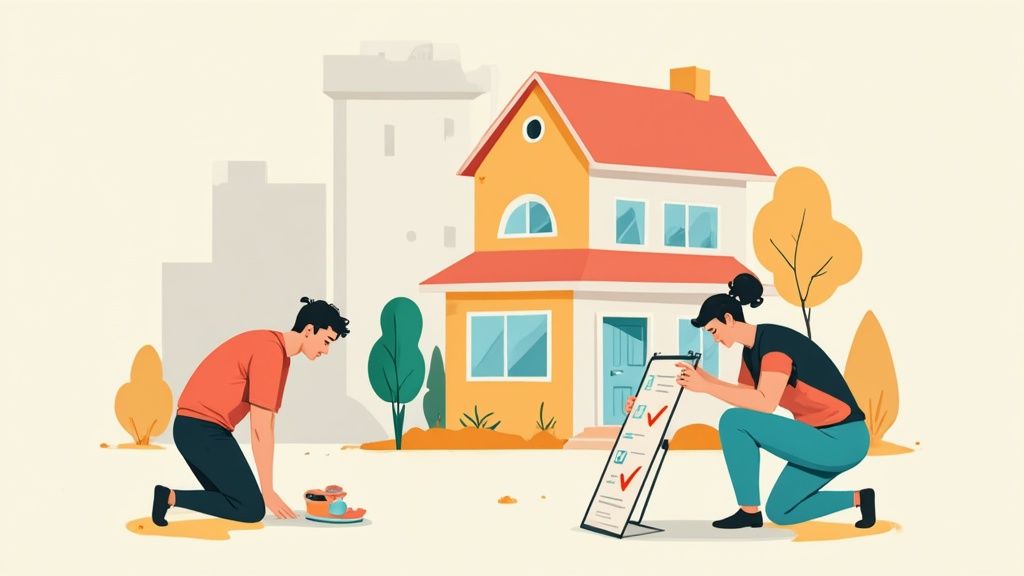
It's only natural to have a lot of questions when you're thinking about buying a home in another country. Let’s tackle some of the most common ones we hear from international buyers looking at the Japanese market.
Do I Need a Visa or Residency to Buy Property in Japan?
Surprisingly, no. You don't need any special visa or residency status to purchase real estate in Japan. Foreigners can legally buy and own property outright, even if you’re just visiting on a tourist visa. This openness is one of the big draws of the Japanese market.
The real hurdle, though, is financing. If you don't have permanent residency, getting a mortgage from a Japanese bank is next to impossible. For that reason, most non-resident buyers end up making cash purchases.
What Is the Role of a Judicial Scrivener?
Think of a judicial scrivener, or shihoshoshi, as the final, essential legal expert in your property purchase. You literally cannot complete a transaction without one. Their main job is to handle the official registration of the property in your name.
They'll prepare all the necessary legal paperwork and file it with the Legal Affairs Bureau to formally transfer the title from the seller to you. Their work is what makes the entire process legally sound and officially recognized, protecting your ownership rights for the long haul.
A judicial scrivener is the gatekeeper for a secure and legally recognized property transfer. Their involvement is your guarantee that ownership is correctly recorded in Japan's public registry, giving you critical legal protection.
Can I Rent Out My Property in Japan?
Absolutely. Renting out your property is a popular option. For standard long-term leases, the process is pretty simple. If you're thinking about short-term rentals like Airbnb, that's possible too, but it falls under Japan's "minpaku" (private lodging) law.
This law comes with its own set of rules you'll need to follow:
- You must register the property with the local government.
- You have to follow specific operational guidelines, which often include a 180-day annual rental cap in many cities.
Before you jump into buying an investment property, do your homework on the local regulations. Some apartment buildings or even entire districts have their own strict rules and might even ban short-term rentals completely. To get a head start, make sure to review these essential questions to ask before buying a home in Japan.
Ready to find your dream home in Japan? At mapdomo, our interactive platform makes it easy to explore thousands of properties, from modern city apartments to charming countryside akiyas. Start your search today!